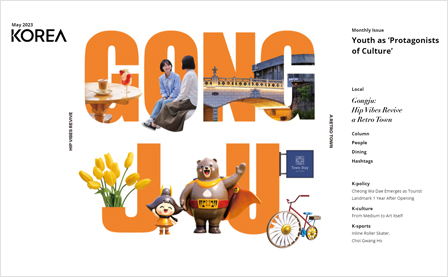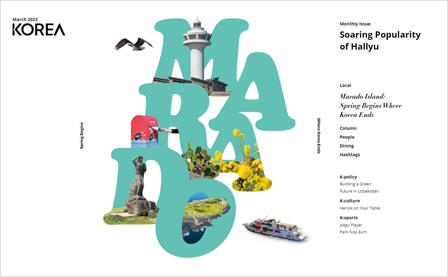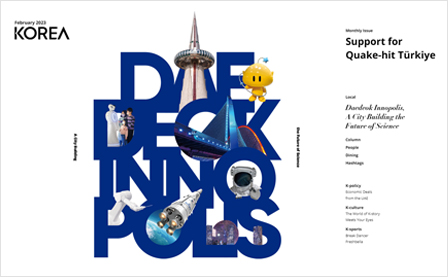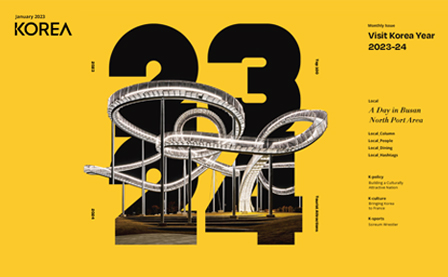June 2023

Global Korea


New KCCs in Sweden, Austria
to Raise Korea’s Image in Europe
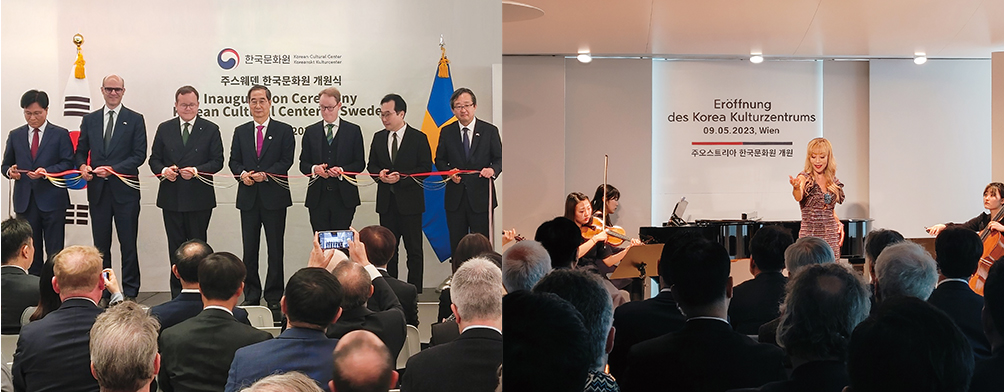
The Korean Culture and Information Service (KOCIS), an affiliate of the Ministry of Culture, Sports and Tourism, has opened Korean Cultural Centers in Sweden and Austria to expand the organization’s bases for promoting Korean culture.
KOCIS on May 9 said it held the day before an opening ceremony for the new KCC in Sweden and planned one for the KCC in Austria on the same day.
The two raised the number of KCCs worldwide to 35, including 13 in Europe.
The KCC in Sweden was officially opened 13 years after cultural promotion officers were first assigned to the Korean Embassy in Stockholm in 2010 amid the rising popularity of Korean culture in Northern Europe.
Located in the residential district of Kungsholmen of downtown Stockholm, the KCC building has six floors and covers 1,660 square m.
This KCC contains Cafe Darak, which serves visitors tea while they sit on the floor in a traditional setting; On, a hall for exhibitions and various performing arts; Bada, a library for Korean literature; and Mat, a space for cooking and eating Korean cuisine.
The opening of the new KCC is expected to spur more active marketing of Hallyu to other neigh-boring Northern European countries such as Finland and Norway.
Leading officials from Korea and Sweden like Prime Minister Han Duck-soo, Korean Ambassador to Sweden Chung Byungwon, KOCIS Director Kim Jangho, Swedish Minister of Foreign Affairs Tobias Billstrom and Stockholm City Council President Olle Burell attended the opening ceremony.
“I’m certain that the KCC in Sweden will serve as a channel through which Korea and Sweden share cultural experiences and raise mutual understanding,” the prime minister said in his congratulatory speech. “Given how the younger generation will especially seek new opportunities for cooperation, the partnership between both countries will further prosper and deepen.”
The KCC’s planned events to promote Korean culture will start with “Small Music Concert” (unofficial translation) on May 9 featuring a haegeum (traditional string instrument) performance and talk with artists, screening of the drama film “Little Forest” on May 10 and a festival for K-pop fan clubs on May 12.
Austria, another KCC was officially opened four years after Korea dispatched cultural promotion officers in 2019 to the Korean Embassy in Vienna.
KOCIS said support for bilateral exchange in sectors such as an accord signed in April 2021 on cooperation in culture and arts, sports, women’s and teen issues, and tourism served as an opportunity.
Located on Carinthian Street in Vienna, the KCC has four floors and a gross floor area of 890 square m.
Facilities include a concert hall, gallery, library and King Sejong Institute classroom plus interactive spaces for Korean culture such as a suragan (royal kitchen) for learning to cook Korean cuisine; daecheongmaru (wooden floor hall) highlighting the beauty of Hanok (traditional architecture); and sarangbang (guest reception room at a traditional home) for trying on Hanbok (traditional clothes).
Leading officials from both Seoul and Vienna like Prime Minister Han, Korean Ambassador to Austria Ham Sang Wook, KOCIS Director Kim, former Austrian President Heinz Fischer, and Austrian Vice Chancellor and Minister for Arts, Culture, the Civil Service and Sport Werner Kogler will attend the opening ceremony on May 9.
A congratulatory performance by musicians from both countries is scheduled featuring renowned soprano Sumi Jo. Two dance teams including Unlimited, a leading K-pop cover dance crew in Austria, and a Hallyu (Korean Wave) fan club will put on a dance performance on the street in front of the KCC before the ceremony.
This KCC’s programs will start with the exhibition “Hanji (traditional paper) and Bojagi (traditional wrapping cloth): Korea’s Colors and Shapes” (unofficial translation) by the artist Lee Seung Chul from May 8 to July 31 and include K-pop dance classes.
The KCC plans to develop a Hallyu festival that attracted in June last year about 10,000 K-pop fans at Donauinselfest, an annual outdoor music event in Vienna, into its main brand project.
“The opening of KCCs in Sweden and Austria as K-Culture’s forward operating bases in Northern and Western Europe is highly significant,” KOCIS Director Kim said. “Korean cinema, literature, handicrafts and Hansik (traditional cuisine) are gaining popularity in Sweden while K-pop, K-dramas and Hansik are gaining fame in Austria. Given the gradual growth of interest and positive response to K-Culture, we expect KCCs to play a major role as focal points in producing a new wave of K-Culture.”
 View of all
View of all